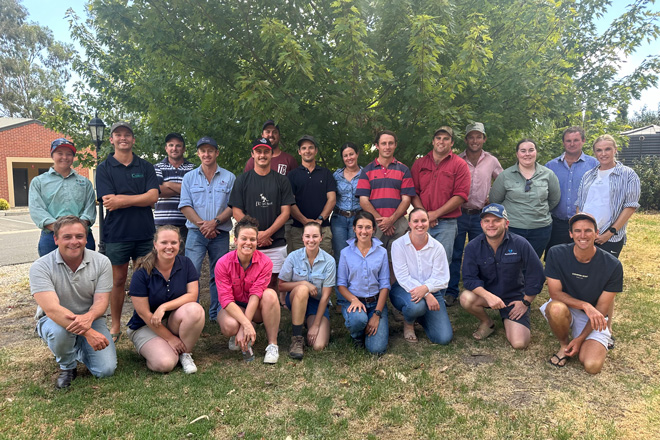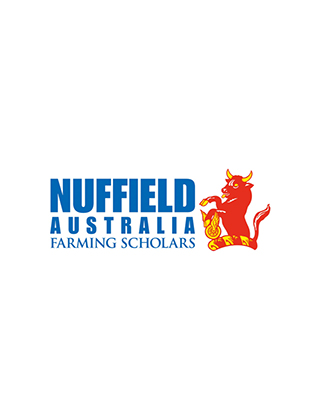Australian Rural Leadership Program
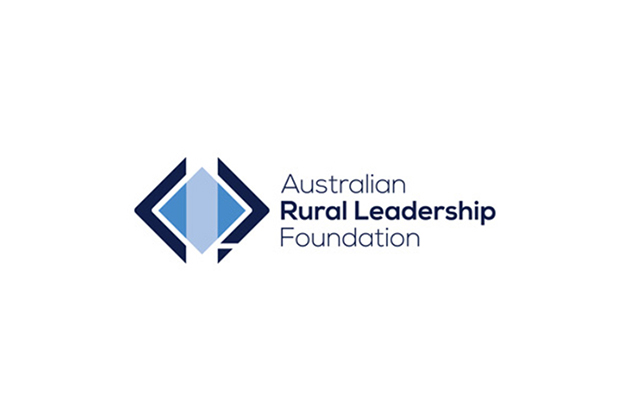
We invite wool industry applicants to join a network of informed, capable and ethical leaders working collaboratively for their industry, communities and rural Australia, through the Australian Rural Leadership Program.
The Australian Rural Leadership Program (ARLP) is a 15-month program that supports emerging rural leaders and AWI funds the participation of emerging wool industry leaders in the program.
ARLP wool industry leaders engage with AWI, the wool industry and community about the learnings from the ARLP and continue to use these learnings for the advancement of rural and regional Australia.
The program is producing a network of informed, capable and ethical leaders to work collaboratively to advance the interests of their industries, communities and rural Australia.
The ARLP is a 15-month program which takes place over five sessions, across Australia and Asia.
Peter McCrabb – ARLP Course 22
Peter McCrabb shares the impact the Australian Rural Leadership Program had on him. He is a graduate of Course 22 of the program.
The ARLP is based on Australian Rural Leadership Foundation's Leadership Philosophy:
- Disrupt: multiple experiential challenges (physical, emotional, mental, social and intellectual) in changing real-world situations.
- Discover: opportunities for critical self-reflection and a deeper understanding of others’ perspectives.
- Develop: behavioural intelligence, the ability to trust and support others and the confidence to lead in different contexts.
- Deliver: tangible, positive change in your organisation, sector or community through new conversations and connections.
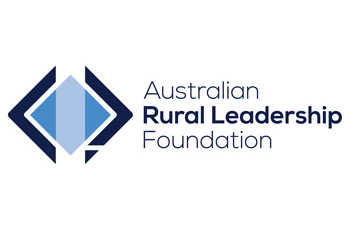
Applying for the ARLP
ARLP will commence in June 2025 and finishes in September 2026.
Recent wool industry participants in the ARLP
The information below was accurate at the time of the participant's involvement with the program.
Course 30 – Jennifer Medway, Gunning, NSW

Jennifer is a fifth-generation farmer from Gunning on the Southern Tablelands of NSW. With her husband and three children, she runs a commercial Merino enterprise that is committed to new technologies and management practices and also works for the National Farmers’ Federation managing the Regional Tech Hub.
Jennifer graduated from the University of Sydney with a Bachelor of Agricultural Economics (Hons) and has worked with the Australian Government Department of Agriculture, Fisheries and Forestry as well as AgriFutures Australia. She is the former Deputy Chair of MerinoLink Pty Ltd and an executive member of several local community groups in the Upper Lachlan region.
Jennifer was awarded the 2021 Lambition Award for Industry Leadership and is passionate about the profitability and sustainability of Australian agriculture and regional communities.
Course 27 – Louise Martin, Tambo, QLD
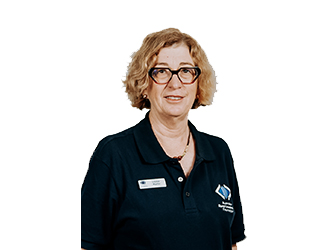
Louise is a sheep, wool and cattle producer who grew up in Western and North West Queensland, primarily on cattle properties. She then travelled extensively overseas, before settling back in Western Queensland on a sheep stud at Tambo, where she has since been absorbed in growing sheep and wool. Louise is the Queensland Vice President of The Isolated Children’s Parents Association, working to ensure equity of education for rural and remote students. She is passionate about ensuring the survival, regrowth, and continuing vibrancy of rural communities in Western Queensland.
Course 26 – Kirsty Wall, Bukkulla, NSW
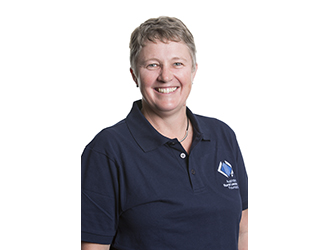
Kirsty Wall from Bukkulla near Inverell NSW, who is a RN / Midwife / Child & Family Health Nurse and helps run the family sheep (18.5 micron Merino wool) and cattle enterprise, started her AWI-sponsored participation in Course 26 in July 2019 and will complete her course in October 2020.
Course 25 – David Young, Bookham, NSW
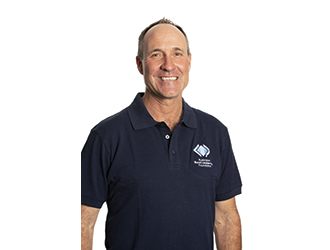
David Young from Bookham in the Southern Tablelands of NSW, who runs and manages a 1,200-hectare aggregation focusing on fine wool, prime lamb and beef production started his AWI-sponsored participation in Course 25 in July 2018 and will complete his course in October 2019
Course 24 – Stacey Lugsdin, Hay, NSW
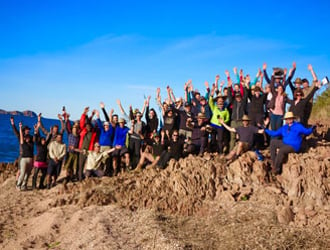
Woolgrower Stacey Lugsdin, who with her family runs a self-replacing Merino enterprise at 'Warrendale' north-east of Hay in the western Riverina district of NSW, will complete her AWI-sponsored participation in Course 24 in October 2018.
"I used to think that leaders always led from the front, but now I believe that leaders can 'lead from the back', in that they should encourage and guide people, especially the next generation, nurturing new ideas so the industry can move ahead in innovative ways," she said.
"The next generation is more technology-minded and forward-thinking than the last. We need innovation in the wool industry, so we must nurture the young people in the industry.
Stacey said the course provided a broad range of experience.
"The two weeks in the Kimberley helped examine how participants reacted in unfamiliar situations, and how that can help develop character and leadership skills.
"The time spent in Indonesia gave us a better understanding and appreciation of different cultures. One of the key things I learnt there was that all businesses (big or small, Australian or overseas) are at the mercy of the market, and it is important to try and take volatility out of markets - which is something that applies to the wool industry too."
Read more about Stacey’s experience of the ARLP in the September 2018 edition of Beyond the Bale.
Course 23 – Bert Matthews, Hay, NSW and Carol Huggins, Hay, NSW
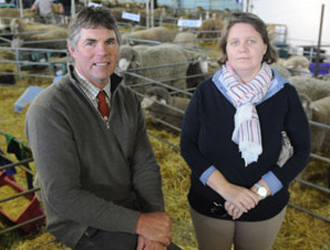
Bert Matthews, who with his wife Liz runs 'Bedarbidgal' at Hay in NSW, and neighbour Carol Huggins who runs the nearby 'Eurolie' and 'Woodpark Poll Merino Stud', with her husband Stephen, graduated from the 2016-17 program in October 2017 thanks to sponsorship from AWI.
"Has this program changed me? My answer is most definitely 'yes'," Bert said. "There are so many things that have truly made this program a wonderful life changing experience and I am kicking myself because I should have done it earlier.
"I had been thinking of withdrawing from community activity to let others – younger people with fresh ideas – be the catalyst for change. But a past graduate suggested I should apply to the program, and I am so glad that I did because it is one of the best things I have ever done in my life."
Carol also is very enthusiastic about her experience on the course and says she feels privileged to have done it.
"The program fast tracks a broad range of training and condenses years of experience into 15 months," Carol said.
"The exposure to and interaction with the other people on the course – and the benefits of having an extensive and supportive alumni network going forward – has been invaluable. The facilitated approach to the entire program was a real strength of the course too."
Course 22 – Peter McCrabb, Booroorban, NSW
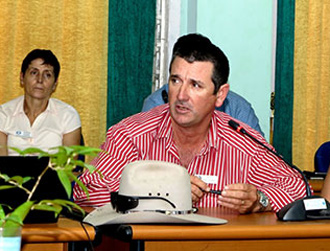
Woolgrower Peter McCrabb, who with his wife Lisa runs a large self-replacing Merino flock at 'North Bundy' at Booroorban in the western Riverina district of NSW, has completed his AWI-sponsored participation in Course 22 of the ARLP.
Peter encourages people in the wool industry to apply for the course, saying it condenses into months what community leaders would normally take years acquiring.
"While the program is a large commitment for participants and their families, it fast-tracks a wide range of training into a short time frame. It provides a unique experience that is hard to find outside the program," he says.
Peter says all the sessions have been valuable, with the media relations session particularly interesting.
"But my favourites were the two weeks in the Kimberley at the start of the course, where we learnt about relating to others in an unfamiliar environment, and the two weeks in June where we travelled to and studied leadership in Indonesia."
Read more about Peter’s experience of the ARLP in the September 2016 edition of Beyond the Bale.
Course 19 - Mary Goodacre, Eugowra NSW
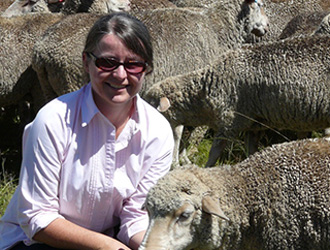
Mary produces Merino wool, beef and native grass seed in central NSW, and is a partner in a livestock consultancy. After studying agricultural science, Mary worked with several agricultural and natural resource organisations in NSW and the Northern Territory, and was a member of three natural resource and Aboriginal cultural heritage boards in NSW.
"The decline of many small country towns like ours closely followed the collapse of the wool industry in the late 1980's," said Mary. "But profitable wool and sheep enterprises are again creating employment and confidence in rural economies and communities.
"Rural Australia needs positive leaders in rural communities to build on the opportunities," she said. "I am grateful for the opportunity to develop my leadership skills through AWI's sponsorship of my participation in the Australian Rural Leadership Program."
Read more about Mary’s experience of the ARLP in the December 2013 edition of Beyond the Bale.
Course 16 - Ben Watts, Molong NSW
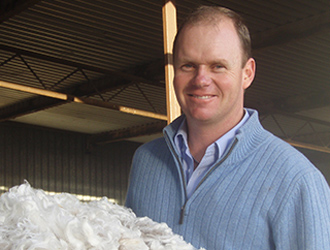
Ben owns a sheep stud based in Central West NSW producing superfine genetics for Australia's Wool Industry. He is actively involved in the international sheep and wool industry as Chairman of the World Sheep and Wool Council and the Australian representative on the Board of the World Council of Sheep Breeders. Ben holds a Diploma in Agriculture and a Masters in Sustainable Agriculture.
During the Australian Rural Leadership Program, experiences managing the personalities in the group of highly driven future rural leaders changed Ben's approach to leadership. "Now when working with the broader wool industry through grower groups, I use a more collaborative approach," said Ben. "That allows growers to share their views and experiences to build a framework for how they want to move forward."
Ben also spent time with wool industry stakeholders during the group's trip to India. "It was a real highlight to see that they truly believe that Australia provides the world's best wool," said Ben.
Course 15 - Christopher Mirams, NSW
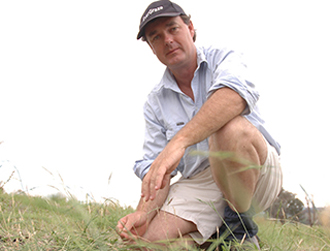
Chris has a keen interest in farming systems that concurrently strive to achieve demanding production targets and natural resource management targets. He has been active in Landcare and EverGraze. Chris has an Associate Diploma of Farm Management and a Diploma in Financial Markets.
Through the Australian Rural Leadership Program, Chris learned about the three levels of leadership - leading yourself, leading yours and leading others. "True leadership is about bringing out the best in others," said Chris. "There is no doubt that I am a far more effective leader having completed the program."
Chris believes that leadership and applying new technology will be key ingredients for a prosperous future. "AWI and the Australian Rural Leadership Foundation are playing important roles in building capacity in rural Australia," said Chris.
Course 14 - Carol Watson, Walcha NSW
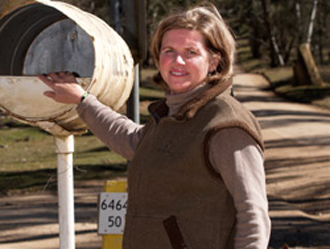
Carol is partner in an innovative New England grazing property that applies technologies like genetic evaluation to the production of fine wool. An agricultural professional, Carol's earlier career broadened to take on a community and family focus, including as a director of New England Girls' School Limited. Carol is a member of Australian Institute of Company Directors, holds a Bachelor of Agricultural Science (Honours) from the University of Queensland, and qualifications in psychology.
Carol chose to participate in the Australian Rural Leadership Program to challenge and extend herself. "The program gave me the courage to deal confidently with uncertainty and conflict, and embrace change," said Carol. "Change is constant and inevitable."
At program sessions in Canberra, Trade Envoys commented on the image of Australia's wool industry on the international stage. "While the image is not one of a cohesive industry, the leadership of AWI has entered a new phase," said Carol. "AWI has an excellent opportunity to implement a new, modern and effective culture of board leadership with outcomes for woolgrowers.
"I would like to thank AWI for sponsoring my position on this excellent program," said Carol. "It has been one of the greatest opportunities I have taken."
Course 13 - Miles Cockington, Port Vincent SA
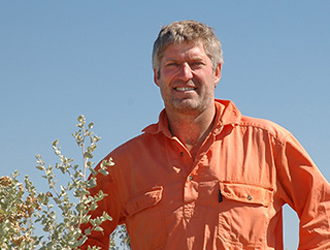
Miles owned and managed a pastoral property in South Australia before relocating to his mixed farming enterprise on the Yorke Peninsula. He is involved in the Merino industry and is a "soft rolling skin" wool/sheep classer and an artificial breed technician. Miles is involved with successfully reclaiming dryland salinity into productive pastures. His farm has won many Landcare awards and hosts research programs for schools and universities. Miles is also a board member of the School of the Air.
While participating in the Australian Rural Leadership Program, Miles and his family negotiated the change from extensive pastoralism to mixed farming. The program exposed Miles to an enormous amount of individual and collective learning, helping him develop goals and plans for his new future.
"I drew on all the learnings related to negotiation that we received in the Melbourne session," said Miles. "I set up a professional partnership with several of the course participants that enabled my new venture to expand and grow."
Miles is grateful to AWI and the Australian Rural Leadership Foundation for sponsoring his participation in this course. "My life has become exciting, challenging and enjoyable," said Miles. I am determined to show my industry a real alternative for the future in sheep breeding that is ethically acceptable now and into the future."
Course 12 - Maurice Collins, Mount Pleasant SA
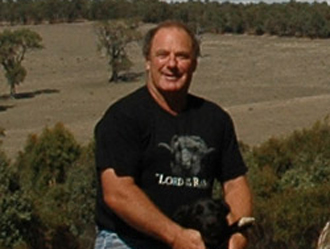
Maurice owns and manages 1,100ha east of Adelaide, producing fine wool Merinos and prime lambs for more than 30 years. Natural resource management reform is high on his agenda. Maurice chairs the Tungkillo Landcare group and is also involved in Soils Boards, Catchment Groups, Natural Resource Centres and the Native Grass Resources Group. Maurice continues to lead his community by example in all natural resource work undertaken on his property.
Low prices and low rainfall have been a considerable challenge to Maurice. "Having worked most of my life as a single operator, it was good to learn new ways of working in groups through the Australian Rural Leadership Program," said Maurice.
Maurice thanked AWI for sponsoring his participation in the program. "Leadership is much easier when we are equipped with the right tools," he said.
Image shows Maurice Collins with working dog, Mt Pleasant, SA
Course 11 - Helen Geard, Tea Tree TAS
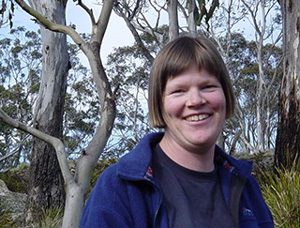
Helen is a Landcare Facilitator with the Southern Midlands Landcare Office. She works with woolgrowers and property managers on natural resource management issues.
Helen is President of the Tasmanian Landcare Association, a board member of Greening Australia (Tasmania), and a member of the Tasmanian Natural Resource Management Council. Helen holds a Bachelor of Arts (IT and Public Administration) and a Graduate Diploma of Environmental Studies.
"I am passionate about rural and regional Australia and in particular, young rural people," said Helen.
During the Australian Rural Leadership Program, she found the Kimberley session an intense experience. "It took me way out of my comfort zone, and convinced me that reflecting on experiences leads to better decision making," Helen said.
Helen thanked AWI for sponsoring her place on the program. "I certainly learned more about AWI and the many diverse programs it is involved in," said Helen. "The program encouraged me to look at the "big picture" and examine how I can be more effective working and participating in a rural community."
Course 10 - Ben Swain, Gunnedah NSW
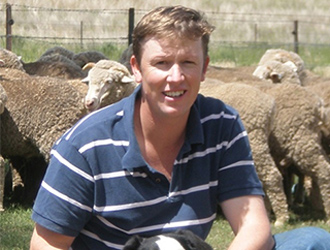
Ben is a woolgrower and principal of his consultancy business providing advice to the international wool industry and solutions for product distribution and supply sourcing. Ben's involvement in his family's agricultural business focuses on wool production and sheep breeding. Ben has a Bachelor's Degree in Applied Science with Honours (Wool and Pastoral Science) and spent seven years with the Australian Wool Exchange Ltd.
Interacting with other program participants, Ben gained experience and a new understanding of strategic thinking and sound leadership. "I have a new-found confidence in taking the initiative to make a positive difference in the wool industry," said Ben.
"Meeting and discussing issues with many of Australia's rural and regional leaders demonstrated different approaches to leadership, depending on the situation," said Ben. "A broader awareness of leadership styles, and new skills in presenting, negotiating, strategic planning and problem solving will make me a more effective leader in the future."
Ben thanked AWI for sponsoring his participation in the program. He looks forward to using his new skills to encourage others in the Australian Wool Industry to act collectively to achieve a bright and prosperous future for Australian wool in the global textile industry.






